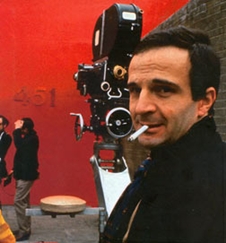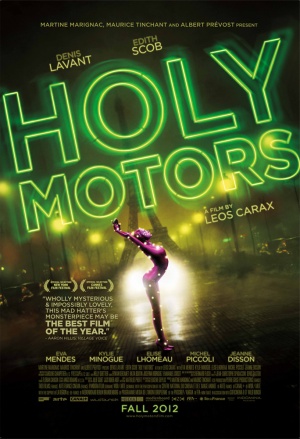![coloca-logo5[1]](http://www.filmnoirblonde.com/wp-content/uploads/2014/04/coloca-logo51.png) The City of Lights City of Angels (COLCOA) Film Festival, a fixture in Los Angeles for 18 years, shows new and classic French films at the Directors Guild in Los Angeles. The fest runs April 21-28.
The City of Lights City of Angels (COLCOA) Film Festival, a fixture in Los Angeles for 18 years, shows new and classic French films at the Directors Guild in Los Angeles. The fest runs April 21-28.
This year’s fest offers another prime schedule of French motion pictures. “We Love You, You Bastard” (or Salaud, on t’aime, to be French about it), the latest film by Claude Lelouch, is the opening night film.
Lelouch, a New Wave writer-director (auteur), won the Palme d’Or at the Cannes Film Festival with his 1966 “A Man and a Woman” (or Une Homme et un Femme). He conquered movie art-houses and has been active ever since. This new Lelouch movie stars two venerable French rock stars Johnny Hallyday and Eddy Mitchell in a story about sowing wild oats and dealing with the results.
What is showing to tempt noiristas? Well, 1960’s “Purple Noon,” one of the great film noirs, starring Alain Delon and Maurice Ronet. This gripping thriller was directed by Rene Clement, based on a novel by the American expatriate crime writer Patricia Highsmith and dazzlingly shot by Henri Decae. It screens at 1:45 p.m., on Tuesday, April 22.
![our-heroes[1]](http://www.filmnoirblonde.com/wp-content/uploads/2014/04/our-heroes1.jpg)
![le-dernier-diamant[1]](http://www.filmnoirblonde.com/wp-content/uploads/2014/04/le-dernier-diamant1.jpg) Then, there’s the highly popular Film Noir Series on Friday, April 25. Can’t wait! At 5:30 p.m. is the North American premiere of “Our Heroes Died Tonight” (Nos héros sont morts ce soir). Set in early-1960s Paris, this minimalist noir, written and directed by David Perrault, plunges into the seedy world of semi-professional wrestling where backroom dives smell of Gauloise and sweat, and the fights are all rigged.
Then, there’s the highly popular Film Noir Series on Friday, April 25. Can’t wait! At 5:30 p.m. is the North American premiere of “Our Heroes Died Tonight” (Nos héros sont morts ce soir). Set in early-1960s Paris, this minimalist noir, written and directed by David Perrault, plunges into the seedy world of semi-professional wrestling where backroom dives smell of Gauloise and sweat, and the fights are all rigged.
At 7:30 p.m. Eric Barbier’s heist thriller “The Last Diamond,” makes its international premiere. Starring Bérénice Bejo and Yvan Attal, the film follows in the tradition of Jean-Pierre Melville’s “Le Cercle Rouge.” The carrot for the crooks is mighty pretty: the fabled Florentine, a 137-carat yellow diamond last seen in 1918, which has resurfaced and is up for sale in an exclusive Antwerp auction house.
![venus-in-fur[1]](http://www.filmnoirblonde.com/wp-content/uploads/2014/04/venus-in-fur1.jpg) The Larriere Brothers’ crime drama “Love is a Perfect Crime” plays at 10:30 p.m. Adapted from “Incidences” by Philippe Dijan, whose other novels inspired the films “Betty Blue” and “Unforgivable,” this chilly thriller revolves around a University of Lausanne student who goes missing. The top suspect? Her professor and lover, natch. “Love is a Perfect Crime” stars Mathieu Almaric, Karin Viard, Maiwenn and Sara Forrestier. This is the film’s West Coast premiere.
The Larriere Brothers’ crime drama “Love is a Perfect Crime” plays at 10:30 p.m. Adapted from “Incidences” by Philippe Dijan, whose other novels inspired the films “Betty Blue” and “Unforgivable,” this chilly thriller revolves around a University of Lausanne student who goes missing. The top suspect? Her professor and lover, natch. “Love is a Perfect Crime” stars Mathieu Almaric, Karin Viard, Maiwenn and Sara Forrestier. This is the film’s West Coast premiere.
There are two other enticing events on Friday. The massively influential but too mortal (and gone too soon) French auteur François Truffaut will be remembered at a 1:30 p.m. screening of his very personal 1977 tale of a femme-chaser “The Man Who Loved Women,” starring Charles Denner as the Man, and Brigitte Fossey, Nathalie Baye and the supremely piquant Leslie Caron as some of the Women. There will be a talk on Truffaut after the movie.
At 8:30 p.m., that brilliant and elusive Polish-American-French cineaste, Roman Polanski will be represented by his latest film “Venus in Fur,” based on the masochistic novel by Leopold Sacher-Masoch and David Ives’ play from it. “Venus” stars Polanski’s muse-mate Emmanuelle Seigner as an extroverted actress who shows up after hours to read for a part.
![la-belle-et-la-bete[1]](http://www.filmnoirblonde.com/wp-content/uploads/2014/04/la-belle-et-la-bete1.jpg)
![the-murderer-lives[1]](http://www.filmnoirblonde.com/wp-content/uploads/2014/04/the-murderer-lives1.jpg) On Saturday, at 11 a.m., the one French film of this year’s glittering menu that you absolutely don’t want to miss: the 1946 fairytale treasure “Beauty and the Beast,” written and directed by Jean Cocteau. Josette Day stars as Belle and Jean Marais as Bete. The film was photographed (lustrously) by Henri Alekan, scored (hauntingly) by Georges Auric and technically advised by Rene Clement, who we suspect, had more to do with the film‘s impeccable, fantastic technique than just advice.
On Saturday, at 11 a.m., the one French film of this year’s glittering menu that you absolutely don’t want to miss: the 1946 fairytale treasure “Beauty and the Beast,” written and directed by Jean Cocteau. Josette Day stars as Belle and Jean Marais as Bete. The film was photographed (lustrously) by Henri Alekan, scored (hauntingly) by Georges Auric and technically advised by Rene Clement, who we suspect, had more to do with the film‘s impeccable, fantastic technique than just advice.
If fairytales aren’t your tray of gateaux, there’s a brutally real alternative: “Abuse of Weakness,” a fierce semi-autobiographical drama by auteur Catherine Breillat about her own fleecing by a famous conman. “Abuse” screens at 7:45 p.m.
“We Love You, You Bastard” rescreens at 1:15 p.m.
Sunday brings the closing session of the competition, but there are two more major French classics on Monday, April 28. At 2 p.m., you can see the great director Patrice Chereau’s 1994 adaptation of Alexandre Dumas’ breathless historical novel “Queen Margot” (La Reine Margot). Chereau’s film stars Isabelle Adjani and Daniel Auteuil.
And at 3:30 p.m. there’s another film noir, a black-and-white ‘40s classic: “The Murderer Lives at No. 21” by Henri-Georges Clouzot. French stage and screen actor Louis Jouvet stars as the relentless detective Wens.
The COLCOA screenings are at the Directors Guild, 7920 Sunset Blvd., Los Angeles, 90046.
![amourcrime[1]](http://www.filmnoirblonde.com/wp-content/uploads/2014/04/amourcrime1.jpg)












From FNB readers